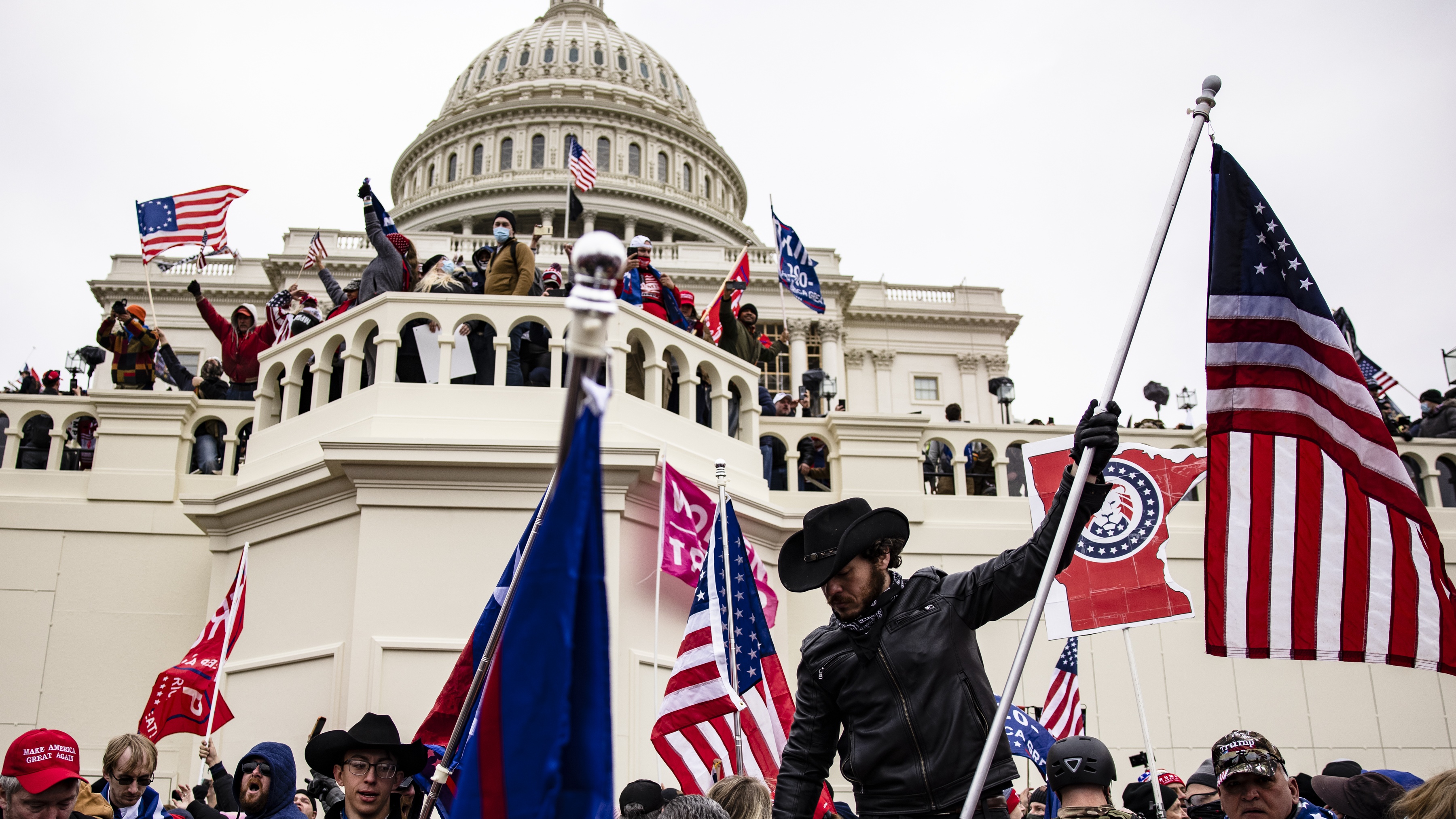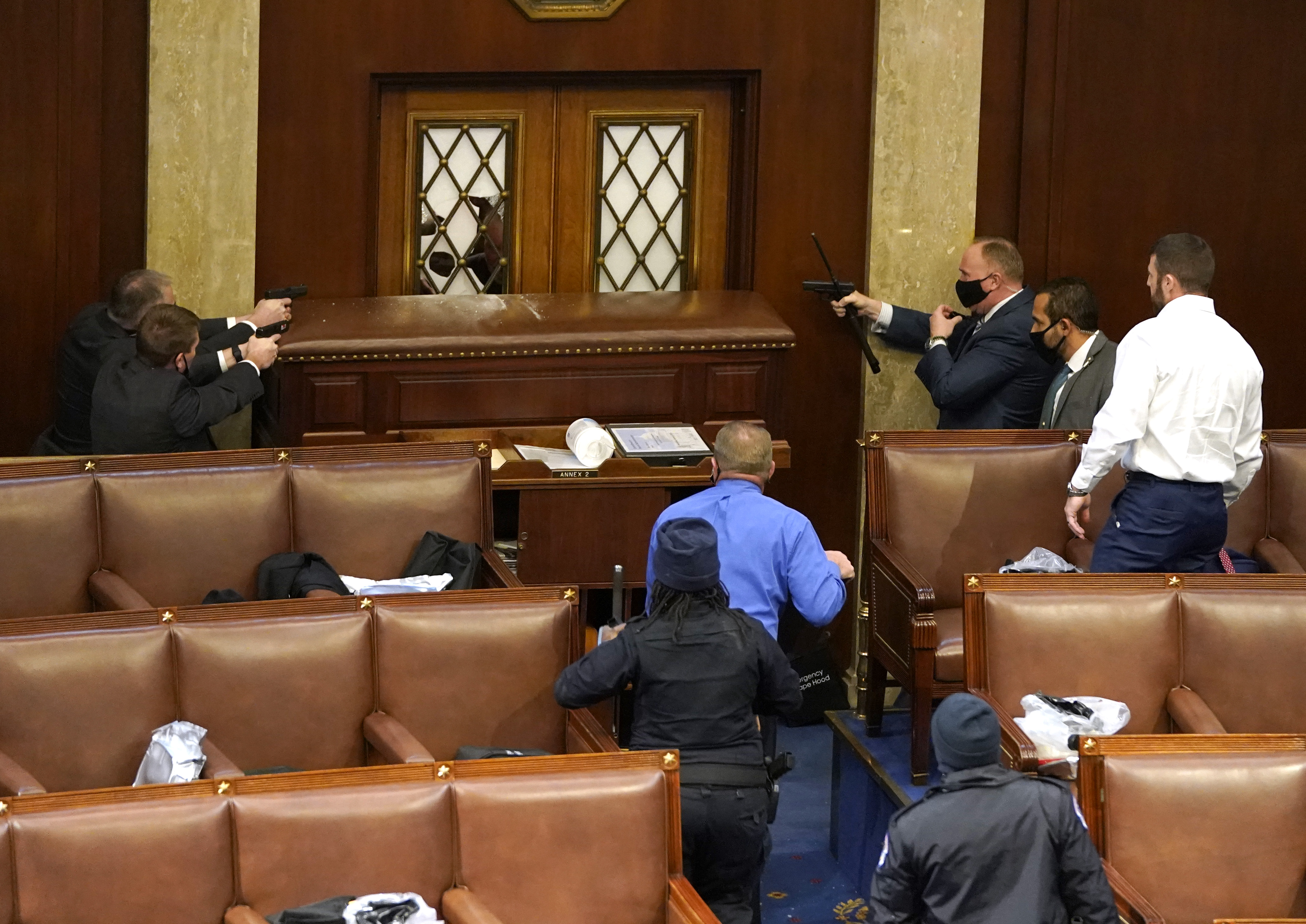What does the Capitol Hill siege mean for Donald Trump’s legacy?
President left isolated within his own party after violence in Washington D.C.

A free daily email with the biggest news stories of the day – and the best features from TheWeek.com
You are now subscribed
Your newsletter sign-up was successful
Following weeks of rows about the legitimacy of the US election result, Donald Trump’s supporters yesterday exploded in a show of rage that struck at the heart of American democracy.
A mob of the president’s backers - some heavily armed - descended on the Capitol, breaching the seat of power for the first time since the British attacked and burned the building to the ground in August 1814.
Amid calls for the president to halt the assault, Trump instead posted a now-removed video on Twitter in which he again questioned the outcome of the November election. “I know your pain. I know you’re hurt. We had an election that was stolen from us,” he told his supporters.
The Week
Escape your echo chamber. Get the facts behind the news, plus analysis from multiple perspectives.

Sign up for The Week's Free Newsletters
From our morning news briefing to a weekly Good News Newsletter, get the best of The Week delivered directly to your inbox.
From our morning news briefing to a weekly Good News Newsletter, get the best of The Week delivered directly to your inbox.
Order was finally restored after Vice-President Mike Pence reportedly gave the order to send in the National Guard. As pressure now grows for Pence to invoke the 25th Amendment to remove his boss from office, BBC North American reporter Anthony Zurcher says that “this is how the Trump presidency ends. Not with a whimper, but with a bang.”
Last days of Rome
Four years ago, Trump pledged during his inauguration to end the “American carnage” and bring prosperity back to the country’s forgotten corners with an “American first” agenda.
Instead, as the shards of glass are swept up on Capitol Hill, memories of his reign will be dominated by images of “officers with weapons drawn, defending the chamber of the House of Representatives against a window-smashing mob”, writes David Von Drehle in The Washington Post.
A free daily email with the biggest news stories of the day – and the best features from TheWeek.com

This was “Trump’s riot”, he continues, “and characteristically, having stirred things up, Trump retired to the safety of his self-centered bubble to let others deal with the consequences”.
Placing the blame squarely at the feet of the departing president, The Economist says that we should be in “no doubt that Trump is the author of this lethal attack on the heart of American democracy”.
“His lies fed the grievance, his disregard for the Constitution focused it on Congress, and his demagoguery lit the fuse,” the paper continues.
“Pictures of the mob storming the Capitol, gleefully broadcast in Moscow and Beijing just as they were lamented in Berlin and Paris, are the defining images of Mr Trump’s unAmerican presidency.”
Trump’s videoed address to his supporters echoed his response to the violence perpetrated by far-right demonstrators in Charlottesville three years ago, adds the BBC’s Zurcher, and “was the kind of kid gloves way the president has routinely responded to transgressions from his supporters”.
The tweeted footage, and two subsequent posts in which Trump also praised his supporters, were flagged and later removed by the social media giant. Twitter then took the unprecedented step of locking the president’s account for 12 hours, while Facebook banned him for a day.
“For the first time in his presidency, for the first time in his long, intimate relationship with social media, Donald Trump had been silenced,” says Zurcher.
Yet while the Republican leader will soon depart the world stage, “scenes of violence in Washington will be hard for America to recover from”, says Sky News’ diplomatic editor Dominic Waghorn.
“Americans are hugely proud of the peaceful transfer of power that has happened every four years since the founding of their republic,” Waghorn writes.
But “that break with the tradition of a peaceful, cooperative handover of government will be one part of his legacy”.
Et tu, Brutus?
Trump’s role in the violence has been met with condemnation both abroad and closer to home, with former allies also turning on the president.
Tensions within the Republican Party had been nearing breaking point in the run-up to the scheduled congressional affirmation yesterday of Joe Biden’s election victory.
First, Pence ignored Trump’s call for him to throw out the vote result, instead releasing a statement insisting that the VP’s role as presiding officer of the Senate was “largely ceremonial”.
And following the storming of Congress, Pence is said to have gone above Trump to call in the National Guard to halt the demonstrations.
Republican Senate leader Mitch McConnell had also turned on Trump shortly before the violence erupted. “If this election were overturned by mere allegations from the losing side, our democracy would enter a death spiral,” McConnell said during an emotional speech from the Senate floor.
As the subsequent assault on the Capitol triggered a fresh flood of criticism of the outgoing president, a 2016 Trump campaign official told Politico that “he screwed his supporters, he screwed the country and now he’s screwed himself”.
Scott Jennings, a former aide to President George W. Bush, added: “Donald Trump caused this insurrection with lies and conspiracy theories about the election being rigged against him. The election was not stolen but this madness was fomented by the president and his top advisers.”
Meanwhile, unnamed Republican leaders described Trump as “out of control”, as calls grew for the 25th Amendment to be invoked to remove the president from office before Biden is sworn in on 20 January.
And then the resignations began. First out was deputy press secretary Sarah Matthews and Melania Trump’s chief of staff Stephanie Grisham. They were quickly followed out of the door by the president’s deputy chief of staff Chris Liddell, his deputy national security adviser Matt Pottinger and White House social secretary Rickie Niceta.
“The Capitol violence pretended to be a show of power. In fact, it masked two defeats,” says The Economist.
“While Trump’s supporters were breaking and entering, Congress was certifying the results of the president’s incontrovertible loss in November.”
And “while the mob was smashing windows”, Democrats were celebrating “a pair of unlikely victories” in run-off elections in Georgia that will give them control of the Senate.
As Trump now watches the clock tick down to his departure from the White House, he faces a major challenge if he is to “rebuild a legacy that, for the moment, lies in tatters”, concludes the BBC’s Zurcher.
Joe Evans is the world news editor at TheWeek.co.uk. He joined the team in 2019 and held roles including deputy news editor and acting news editor before moving into his current position in early 2021. He is a regular panellist on The Week Unwrapped podcast, discussing politics and foreign affairs.
Before joining The Week, he worked as a freelance journalist covering the UK and Ireland for German newspapers and magazines. A series of features on Brexit and the Irish border got him nominated for the Hostwriter Prize in 2019. Prior to settling down in London, he lived and worked in Cambodia, where he ran communications for a non-governmental organisation and worked as a journalist covering Southeast Asia. He has a master’s degree in journalism from City, University of London, and before that studied English Literature at the University of Manchester.
-
 Local elections 2026: where are they and who is expected to win?
Local elections 2026: where are they and who is expected to win?The Explainer Labour is braced for heavy losses and U-turn on postponing some council elections hasn’t helped the party’s prospects
-
 6 of the world’s most accessible destinations
6 of the world’s most accessible destinationsThe Week Recommends Experience all of Berlin, Singapore and Sydney
-
 How the FCC’s ‘equal time’ rule works
How the FCC’s ‘equal time’ rule worksIn the Spotlight The law is at the heart of the Colbert-CBS conflict
-
 Local elections 2026: where are they and who is expected to win?
Local elections 2026: where are they and who is expected to win?The Explainer Labour is braced for heavy losses and U-turn on postponing some council elections hasn’t helped the party’s prospects
-
 Witkoff and Kushner tackle Ukraine, Iran in Geneva
Witkoff and Kushner tackle Ukraine, Iran in GenevaSpeed Read Steve Witkoff and Jared Kushner held negotiations aimed at securing a nuclear deal with Iran and an end to Russia’s war in Ukraine
-
 Judge orders Washington slavery exhibit restored
Judge orders Washington slavery exhibit restoredSpeed Read The Trump administration took down displays about slavery at the President’s House Site in Philadelphia
-
 Kurt Olsen: Trump’s ‘Stop the Steal’ lawyer playing a major White House role
Kurt Olsen: Trump’s ‘Stop the Steal’ lawyer playing a major White House roleIn the Spotlight Olsen reportedly has access to significant US intelligence
-
 Trump’s EPA kills legal basis for federal climate policy
Trump’s EPA kills legal basis for federal climate policySpeed Read The government’s authority to regulate several planet-warming pollutants has been repealed
-
 House votes to end Trump’s Canada tariffs
House votes to end Trump’s Canada tariffsSpeed Read Six Republicans joined with Democrats to repeal the president’s tariffs
-
 Bondi, Democrats clash over Epstein in hearing
Bondi, Democrats clash over Epstein in hearingSpeed Read Attorney General Pam Bondi ignored survivors of convicted sex offender Jeffrey Epstein and demanded that Democrats apologize to Trump
-
 How corrupt is the UK?
How corrupt is the UK?The Explainer Decline in standards ‘risks becoming a defining feature of our political culture’ as Britain falls to lowest ever score on global index